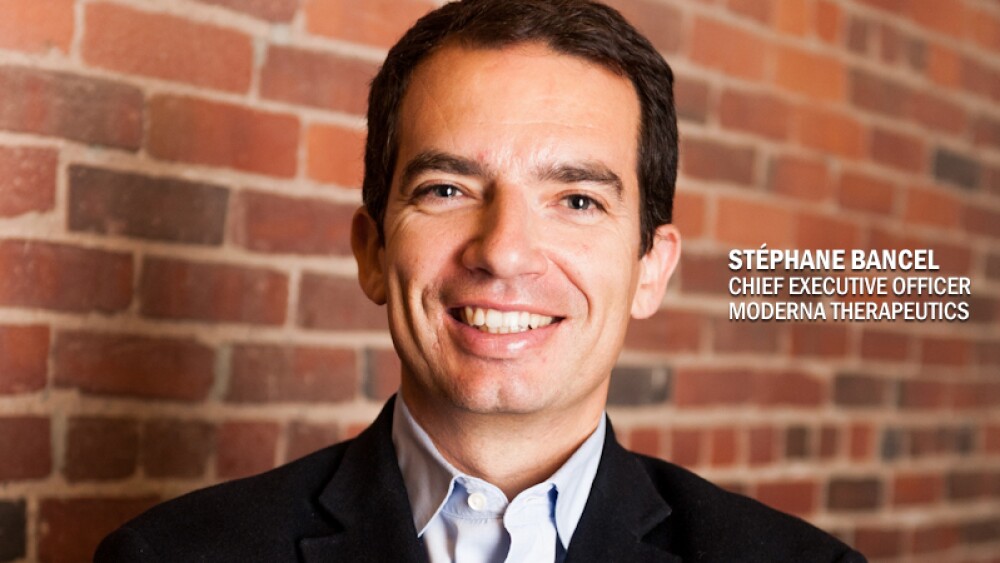December 14, 2016
By Mark Terry, BioSpace.com Breaking News Staff
Moderna Therapeutics, headquartered in Cambridge, Mass., is noted for a number of things. One is that it has about $1.4 billion in cash. It also has partnership deals with Merck & Co. , Vertex Pharmaceuticals , AstraZeneca , and Alexion Pharmaceuticals . It has funding from the Biomedical Advanced Research and Development Authority (BARDA) and the Defense Advanced Research Projects Agency (DARPA).
It’s also known for being secretive. Not much is really public about its technology, which is focused on utilizing messenger RNA (mRNA) to develop a new class of drugs. Forbes published an article today that has an inside look at some of its tech, and the complicated business dealings behind it. The information came from what Forbes writes is “an obscure lawsuit filed in British Columbia in October.”
Moderna licensed technology from a very small company in Vancouver, British Columbia, called Acuitas Therapeutics. It’s basically a one-man company operating out of Thomas Madden, the chief executive officer’s, house. But here’s part of the problem. Acuitas doesn’t own the technology licensed to Moderna. It belongs to a public company, Arbutus Biopharma . Arbutus recently terminated the technology license it granted Acuitas, which is why Acuitas filed the lawsuit. Arbutus countersued, arguing that its deal with Acuitas didn’t cover Moderna’s therapeutics.
In 2011, Moderna was looking for an mRNA delivery system, because it didn’t have the money or personnel to develop one of its own. It looked at a dozen different methods and picked at least three. As Forbes writes, “One belonged to Arbutus, but Moderna turned to tiny Acuitas to get access to it.”
Madden formed Acuitis in 2009 when he was downsized out of Tekmira Pharmaceuticals after a merger. Tekmira eventually became Arbutus. After another lawsuit, Madden licensed the tech from Tekmira/Arbutus.
Forbes wonders why Moderna, which had decent capital, didn’t just license the tech from Arbutus, or at least assure itself that the deal with Acuitas wasn’t a problem. So writers with Forbes met with Stephane Bancel, Moderna’s chief executive officer, to ask him.
He said, “We knew it was not very good. It was just okay.” By that, he meant Acuitas’ technology. He then goes on to talk about Moderna’s own method of creating nanoparticle lipids, which the company claims is better than Acuitas’ version. It’s called N1GEL (“Nigel” internally), and seems to cause less inflammation than Acuitas’ product. In addition, they’ve licensed related technology from Merck (MRK), and claim to no longer be using Acuitas’ technology.
As Forbes writes, “That still leaves a somewhat messy situation for any Moderna vaccines that are being developed using Acuitas’ tech.” It would also seem to point to the likelihood of continuing lawsuits.
Moderna is expecting data from a vaccine trial early in 2017, which could lead to an initial public offering (IPO). Even, Forbes writes, “if the Canadian lawsuit ultimately affords Arbutus bigger royalty payments from Moderna.”
“We’re making medicines that cannot be done using older technology, by getting inside the cells or getting proteins on the membranes of cells,” Bancel told Forbes. “There are diseases where we can have a hope to make drugs where today there is no hope for those patients.”
And maybe they will. But Bancel is no stranger to hyperbole, and reportedly has created a caustic work environment at Moderna. In the last four years, a dozen top executives left the company, including heads of the company’s finance department, technology division, manufacturing, science, cancer and rare disease programs. STAT wrote in September, “At the center of it all is Stephane Bancel, a first-time biotech CEO with an unwavering belief that Moderna’s science will work—and that employees who don’t ‘live the mission’ have no place in the company. Confident and intense, Bancel told STAT that Moderna’s science is on track and, when it is finally made public, that it will meet the brash goal he himself has set: The new drugs will change the world.”
But mRNA can be a tough nut to crack. Novartis , Merck and Roche have all abandoned efforts due to toxicity problems. But if Moderna can crack it, then it might just live up to the hype.





